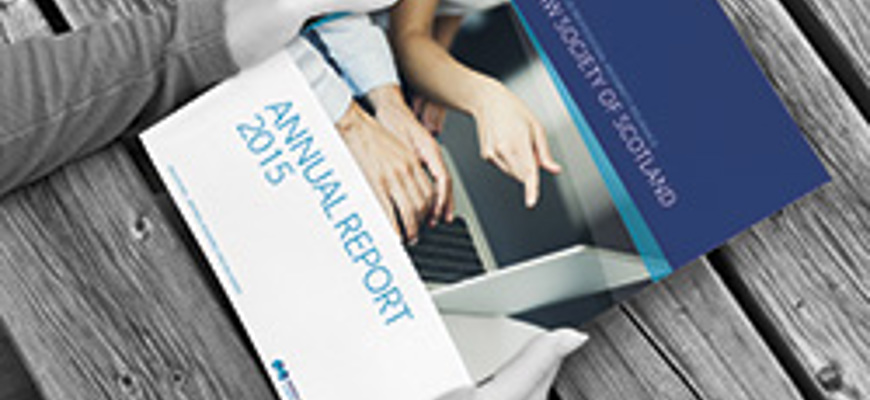Claims: trending?

The Annual Master Policy Report for 2015 is available to all solicitors on the Marsh website for Scottish solicitors – www.marsh.co.uk/scotlaw. To access the report on the website, a username and password is required (each practice has been provided with its own). If you need assistance with username/password or accessing the website, or if you would like a hard copy of the Annual Report, please contact nada.jardaneh@marsh.com.
Numbers of intimations
The number of intimations is a key measurement and one indicator of the success of the profession’s risk management. It is therefore pleasing to observe that the number of Master Policy intimations has continued on a sustained downward trend from a six-year high in 2011-12.
The decrease over the two most recent insurance years was attributable largely to a decline in property/conveyancing-related intimations, and that may be due in part to the reduced level of property transactions over those two years. As activity levels continue to rise, with increasing volumes of property purchases, sales and developments, it is hoped that the reduced frequency of property-related claims is maintained.
Lender claims
Even with the reduced frequency of intimations, property/conveyancing intimations continue to dominate the Master Policy claims experience (by number and value). Most of these are attributable to claims by lenders and, over the past five years, the largest component of lender claims has related to non-compliance with CML Handbook reporting requirements in residential property transactions. These claims reflect the level of borrower default during the economic downturn and losses on repossession incurred by lenders. Much risk management guidance (see www.marsh.co.uk/scotlaw), including the Society’s CML Handbook compliance checklist, has been issued with a view to avoiding recurrence of the adverse claims experience of recent years.
Litigation intimations
The number of litigation-related intimations, which had been falling gradually over a number of years, increased in 2013-14, but only very slightly. Most intimations arise in relation to personal injuries claims/actions.
Time bar intimations, particularly failures to raise personal injuries actions within the relevant limitation period, have been the most common cause of claims in the litigation claims experience for several years. The profession’s management of critical dates achieved successive year-on-year reductions in this category of intimation, although there was an increase in 2013-14. This increase largely accounts for the increase in the total of all litigation-related intimations in 2013-14.
Wills, trusts and executry
By contrast, the number of intimations arising out of wills, trust and executry work, which had shown a consistent increasing trend in recent years, decreased slightly in 2013-14. Frequency of intimations over recent years appears not to have been impacted by the recession and market volatility, as was forecast by some commentators. “Social” factors such as complexity of family relationships and financial affairs have perhaps had some influence, but analysis of intimations shows that the most commonly recurring causes of claim include:
- executry administration – allegations of delay in realising assets causing loss to the estate, and errors in distributing the estate;
- will drafting – allegations of delay where the testator died before the will had been prepared/signed, and drafting errors where it is alleged that the estate did not devolve in the way intended by the testator.
Corporate/commercial
Corporate/commercial transactions tend of be of high value, and the average cost per claim is higher than in any other area of practice. However, the total number and value of claims has been a relatively insignificant feature of the Master Policy claims experience over the past years, in particular when compared with the number and value of property/conveyancing claims. In fact, the number of claims reduced slightly during 2013-14.
There has still been little or no evidence of the concern expressed by insurers that difficult economic conditions could lead to an increase in corporate/commercial claims against solicitors as clients sought to revisit advice and drafting of documents. Claims remain few in number and tend to be very fact specific, with no discernible trends.
External fraud/dishonesty
External fraud/dishonesty claims have become an increasingly significant feature of the Master Policy claims experience in recent years, and that is recognised by the regularity of risk alerts being issued to all practices by Marsh and the Society. As well as client funds being stolen via online banking, there have been various different scenarios resulting in diversion of client funds, as well as instances of identity theft/fraud and other scams impacting on lenders leaving solicitors exposed to claims by the lender. These include:
- fake law firm – a borrower’s solicitors in a commercial loan transaction masqueraded as a genuine law firm, the outcome being that substantial loan funds were transferred to the fraudster’s bank account and the lender was left out of pocket with no valid security;
- interception of emails – a fraudster intercepted email communications between solicitors and the beneficiary of an executry estate, the outcome being that the solicitors were tricked into remitting the beneficiary’s entitlement in the estate to the fraudster’s bank account, believing bank account details to be the beneficiary’s.
Risk management
Considering this commentary on recent and continuing trends in the Master Policy claims experience, it is natural and understandable that the Society’s risk management targets for 2015 continue to be focused on:
- Lender claims/CML reporting failures
This category of claim has been by far the most frequent and costly in the Master Policy claims experience of recent years. As a result, the Society is focused on continuing to raise the profession’s awareness of lender claims/CML matters and the associated risks as a key risk management priority.
- External frauds/scams
The incidence of external frauds/scams and the potential for significant losses and costly claims provide clear justification for this risk management target. Risk alerts addressing identified frauds and scams continue to be issued by Marsh and by the Society to all practices.
- Information security
There is a clear link between information security and external frauds and scams. Practices need to have effective information security policies, and to ensure compliance, if they are to maintain the security and integrity of the data in their possession and minimise the risks posed by external frauds including cyber attacks. Advice already given to the profession includes:
- complying with firms’ own information security policies/procedures;
- locking computers and other electronic devices with secure passwords, and using encryption technology where possible;
- maintaining awareness of key risks and risk controls by reviewing risk management articles and risk alerts, and revising their systems and procedures if necessary;
- undertaking the Marsh e-learning course on information security, which is available on the Marsh website for Scottish solicitors, is free of charge and provides 0.5 hours’ CPD.
- undertaking the e-learning module “Cyber Security for Legal and Accountancy Professionals”, developed by UK Government as part of its National Cyber Security Strategy with the support of both the Law Society of England & Wales and the Institute of Chartered Accountants of England & Wales. This module is also free of charge.
Russell Lang and Marsh
Russell Lang is a former solicitor in private practice, who works in the FINPRO (Financial and Professional Risks) National Practice at Marsh, global leader in insurance broking and risk management. To contact Russell, please email Russell.x.lang@marsh.com
The information contained in this article provides only a general overview of subjects covered, is not intended to be taken as advice regarding any individual situation and should not be relied upon as such. Insureds should consult their insurance and legal advisers regarding specific coverage issues.
Marsh Ltd is authorised and regulated by the Financial Conduct Authority.
In this issue
- Sham marriages v Sham interviews: which is the greater evil?
- A trusts law for the modern era?
- When cash just isn't good enough
- Un voyage en vaut la peine*: SYLA does France
- SYLA ends season on a high
- Appreciation: John Henderson
- Reading for pleasure
- Opinion: Mohammed Sabir
- Book reviews
- Profile
- President's column
- People on the move
- Application forms: should the seller adjust?
- When sharing matters
- After the launch
- Game of strategies
- Broken promises
- Charity legacies: the 10% conundrum
- Another "Whose money?" case
- Barrister barred
- Rearranging the family ties
- Belief in the system
- Living by the code
- The sky's the limit
- Unfinished business
- Law reform roundup
- Appreciation: Joseph Beltrami
- LBTT: what does it mean in practice?
- For those of a certain age
- Claims: trending?
- Ask Ash
- A man for all reasons
- The "TER approach"






